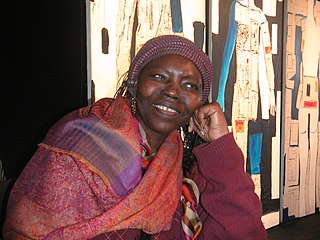Safi Faye
 On 22 November 1943, Senegalese film director and ethnologist Safi Faye was born in Dakar. She was the first Sub-Saharan African woman to direct a commercially distributed feature film, Kaddu Beykat, winning awards at FIFEF (Festival International du Film d’Expression Française), FESPACO (Festival Panafricain du Cinéma d’Ouagadougou), and the Berlin Film Festival.
On 22 November 1943, Senegalese film director and ethnologist Safi Faye was born in Dakar. She was the first Sub-Saharan African woman to direct a commercially distributed feature film, Kaddu Beykat, winning awards at FIFEF (Festival International du Film d’Expression Française), FESPACO (Festival Panafricain du Cinéma d’Ouagadougou), and the Berlin Film Festival.Selected publications
Safi Faye's Mossane: A Song to Women, to Beauty, to Africa / Beti Ellerson. In: Black camera : the newsletter of the Black Film Center/Archives, 2019, Vol.10 (2), p.250-265
Ethnographic Film’s Relation to African Cinema: Safi Faye and Jean Rouch / Matthias De Groof. In: Visual Anthropology, 31:4-5, 2018, pages 426-444
Rites et rythmes de l'eau dans Mossane de Safi Faye / Domingo Pujante Gonzalez. - Editorial Universitat Politècnica de València, 2017
Voices and Songs in Safi Faye's "Mossane" / Vlad Dima. In: The Journal of the Midwest Modern Language Association, 2011, Vol.44 (1), p.29-41
Leçon de Cinéma de Safi Faye / Beti Ellerson. African Women in Cinema Blog, May 26, 2010. https://africanwomenincinema.blogspot.com/2010/05/safi-faye-role-model.html
Safi Faye's Gaze: The Evolution of an African Woman's Cinema / Beti Ellerson. In: Focus on African Films / Pfaff, Françoise (ed.). Indiana University Press, 2004, pages 185–202
African women and de /colonization: Strategies of resistance and dynamics of change in Senegalese women's literature and film / Evelyne Delgado-Norris. Thesis Northwestern University 2003
Safi Faye (Senegal), interview. / Nwachukwu Frank Ukadike. In: Questioning African Cinema: Conversations with Filmmakers. Minneapolis: Univ. of Minnesota Press, 2002, pages 29–40
Mossane / Safi Faye. Paris : La médiathèque des trois mondes, 1996
Safi Faye Mossane - Cinema Lesson in French

